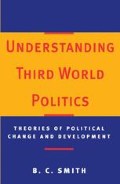Abstract
The two decades following the Second World War saw the final and most dramatic wave of independence sweep across the European empires in Asia, the Middle East and Africa, either as a result of more or less peaceful negotiations between the leaders of the nationalist movements and the European powers, or as the outcome of wars of liberation. What Michael Barratt Brown called ‘one of the great transformations in modern history’ occurred when all but a few million of the 780 million people living in the colonial possessions of the imperial powers ‘freed themselves from subject status’ (Barratt Brown, 1963, pp. 189–90).
Preview
Unable to display preview. Download preview PDF.
Author information
Authors and Affiliations
Copyright information
© 1996 B. C. Smith
About this chapter
Cite this chapter
Smith, B.C. (1996). Neo-Colonialism and Sovereignty. In: Understanding Third World Politics. Palgrave, London. https://doi.org/10.1007/978-1-349-24574-1_5
Download citation
DOI: https://doi.org/10.1007/978-1-349-24574-1_5
Publisher Name: Palgrave, London
Print ISBN: 978-0-333-64405-8
Online ISBN: 978-1-349-24574-1
eBook Packages: Palgrave Social & Cultural Studies CollectionSocial Sciences (R0)

